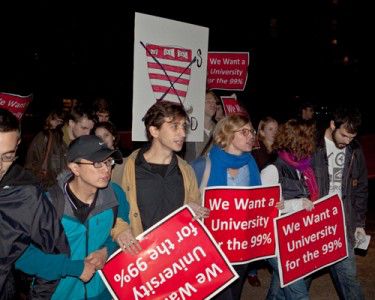
Universities across Boston have become temporary camping grounds for students in support of the Occupy movement representing the college population’s “99 percent.”
Boston University set up an overnight camp in Marsh Plaza last Tuesday from 11 p.m. to about 8 a.m., until the Boston University Police Department and administration requested they leave, the DFP reported last week.
BUPD Capt. Robert Molloy said that officers did not have to break up protesters during that Occupation.
“[The protestors] actually broke up on their own around 8 a.m.,” Molloy said. “We spoke to them about it, what the process is for demonstrating, protesting or setting up any kind of display.”
Molloy said that the use of Marsh Plaza is free to all students if their activity “fits certain criteria.”
Both Harvard College and Northeastern University have since followed suit, setting up tents on their campuses.
Last Wednesday hundreds of students set up tents in Harvard Yard. Since then officers from the Harvard University Police Department set up camp outside of each entrance to Harvard Yard, permitting only students with Harvard student IDs to enter.
Harvard Provost Alan Garber said that the university made the decision to implement such security on campus with an obligation to “safety, security and well-being,” in a mass email to the Harvard community last Thursday.
Some Harvard students said that they disagreed with such security procedures.
“The idea that it’s about safety is ludicrous,” said Harvard Divinity School graduate student Jeff Bridges, an Occupy Harvard demonstrator. “If they were concerned about safety, there are a lot of different things they could do, such as moving just one of the police officers to the actual site. Locking down the Yard is clearly turning the community against us.”
The barrier to entry not only prevents tourists from visiting Harvard Yard, but also keeps out Occupy students from other schools who want to join the movements together.
“It is not Occupy Harvard’s intention to exclude anyone for any reason – in fact, Harvard reached out to BU Occupy and encouraged us to show up in solidarity with them,” said BU College of Communication sophomore Caitlin Condon in an email interview.
Though Harvard’s lockdown of Harvard Yard has decreased the number of non-Harvard affiliates who might have otherwise witnessed the protest, the demonstration is still allowed to carry on.
Starting Sunday evening Northeastern students set up camp at Krentzman Quad.
After a 50-hour occupation the students achieved their goal of “outreach, activism and starting a much needed conversation,” according to a letter thanking the administration for their cooperation on the Colleges Occupy Boston website.
Students at BU involved in the Occupy movement said they believed that they had a right to carry on the Marsh Plaza encampment, despite administrative disapproval.
“The purpose of Occupy Marsh was to raise awareness and support for the Occupy movement in the BU community through a one-night occupation,” Condon said.
Although Captain Molloy said that police did not ask students to leave Marsh Plaza last Tuesday, Condon said that police threatened student protesters with arrests.
“I pay a lot of money to go to school and live on this campus and I don’t see why I should be forced out of any on-campus space at anytime for something like Occupy Marsh,” Condon said.





















































































































